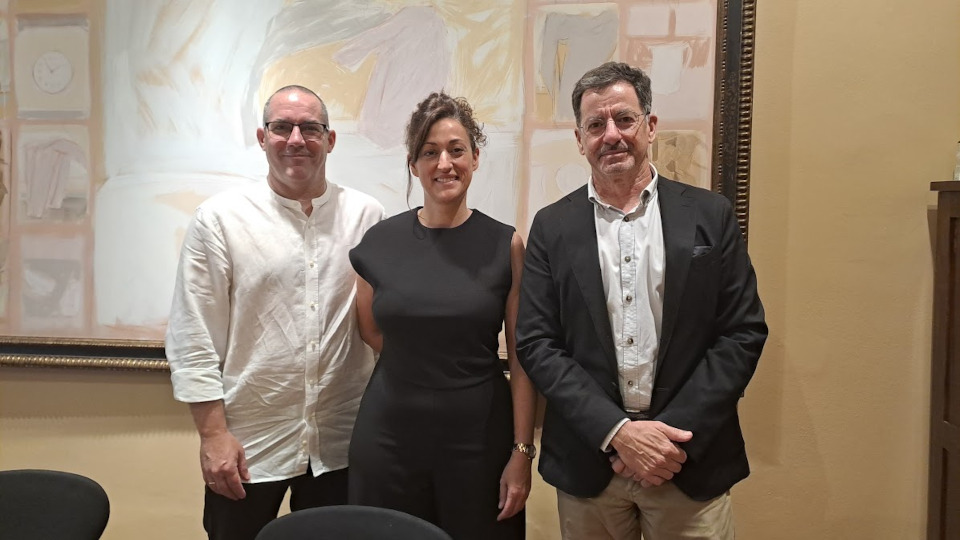Non-invasive neuromodulation is effective against depression and can delay the effects of neurodegenerative diseases
The UNNE Neurostimulation Institute, a new UOC spin-off, has been established to implement these techniques in people with anxiety or depression, and to delay the effects of Alzheimer's and improve patients' well-being after a stroke, among other conditions
An operator with specialized training places two electrodes, an anode and a cathode, on the patient's head. The anode is placed on one side of the head. The cathode is placed on the forehead on the other side. A small device, slightly larger than a mobile phone, induces a very low-intensity electric current that flows between the electrodes. This procedure increases the activity of the neurons under the anode, which have lower levels of activity in diseases such as depression and Alzheimer's. That is how an innovative and promising therapeutic tool for treating mental and neurological diseases works. It can enable a better and faster recovery in cases of depression, anxiety and stroke, and slow down the incurable cognitive deterioration experienced by people with Alzheimer's disease, among other conditions.
The technique is called transcranial electrical stimulation. This procedure and transcranial magnetic stimulation, which has similar effects, are the two most widely used techniques in non-invasive neuromodulation. Researchers at the Universitat Oberta de Catalunya (UOC) aim to promote the use of these techniques in clinical practice, which is why they have created the UNNE Neurostimulation Institute spin-off, a project that has been shortlisted as a finalist for SpinUOC 2024, the UOC's entrepreneurship programme which will culminate on 27 June, when eight innovative projects will be presented at an event open to the public [Update 6/28/2024: UNNE Neurostimulation Institute has won the public and Ramon Molinas Foundation for social impact awards of SpinUOC 2024].
Elena Muñoz presenting her project at SpinUOC
Although the history of clinical research focusing on the effectiveness of non-invasive neuromodulation is not as long as that in other areas, the results are promising, with clinical improvements for various conditions. Furthermore, as those behind UNNE point out, these are not isolated treatments. They have to be combined with the other therapies that are currently known and which are effective for each disease, such as cognitive stimulation, pharmacotherapy, speech therapy, physical exercise or diet. This ability to be used in combination with other interventions is another of the major advantages of these techniques that the spin-off applies to the clinical services it carries out with the HLA Hospital Universitario Moncloa in Madrid, where it is physically located.
Effective against depression, the most common mental illness
According to this Fundación de Educación para la Salud study, based on a 2021 report by the Fundación de Ciencias del Medicamento y Productos Sanitarios, around three million people have been diagnosed with depression in Spain, making it the most common mental illness in the country.
Both magnetic stimulation and transcranial electrical stimulation have proven to be very effective in people with drug-resistant depression. "In depression, as in Alzheimer's, there's an important area of the brain that's hypoactive; in other words, it has a deficit of activity. This is the left dorsolateral prefrontal cortex, which is like the conductor of the brain's orchestra. Making this more active has been shown to alleviate symptoms. And it's very clear it can be translated from one disease to another," explained Elena Muñoz Marrón, a clinical neuropsychologist and co-principal investigator of the Cognitive Neuroscience and Applied Data Science Lab (NeuroADaS Lab) group at the eHealth Center and a member of the Faculty of Health Sciences at the UOC. She also pointed out that the use of these techniques to treat depression, among other conditions, has been approved by the FDA in the United States, and by the European Union.
“In depression, as in Alzheimer's, there's an area of the brain that's hypoactive. Making this more active has been shown to alleviate symptoms.”
Twenty minutes a day to delay the effects of Alzheimer's
Studies have been published in leading scientific journals concerning the use of non-invasive neuromodulation for Alzheimer's, including in the Journal of Clinical Neurology in 2022 and in Aging Clinical and Experimental Research in 2020. According to figures from the Spanish Neurology Society, this disease affects more than 800,000 people in Spain. "And if we add those who suffer from other dementias and their caregivers, it has an impact on about three million people", calculated Juan Luis García Fernández, a member of the team and clinical neuropsychologist at the Barcelona Association of Relatives of People with Alzheimer's and Other Dementia (AFAB).
For this neurodegenerative disease, the first phase of the protocol with which the professionals in the UOC spin-off are working consists of 20 daily sessions lasting 20 minutes each, from Monday to Friday, for four weeks. "Like all interventions for these diseases, the sooner we do it the better. It doesn't work with Alzheimer's patients whose condition is very advanced, because the plasticity of the brain needs to be preserved to a certain extent; the neurons need to have some capacity to function," explained Muñoz Marrón.
"This technique keeps the neurons more active. It's like physical exercise. When you go to the gym every day and suddenly stop, it's much harder when you go back. What we're trying to do is to make the brain more active after a period of inactivity," said García Fernández.
Training health workers, advising centres and treating patients
"Our company transfers research to clinical practice," explained Elena Muñoz. "By creating the spin-off, we want to boost these techniques, which are backed by the most scientific evidence among the non-invasive neuromodulation techniques. What we've learned from the research, we can now take out into society. And the more people it's used on, the more research we can do on its effectiveness. We're looking for a snowball effect."
"Reducing motor and cognitive limitations after a stroke, helping to overcome depression or anxiety, and slowing down cognitive deterioration in Alzheimer's disease have a major impact on the quality of life of many people who can benefit from these techniques. And not only them, but also the people around them and their caregivers, as it improves and prolongs the independence of people affected by a disease like Alzheimer's for which there's still no cure," said García Fernández.
The UNNE Neurostimulation Institute will focus on three areas: training health professionals interested in applying non-invasive neuromodulation techniques in their work; providing advice and consultancy services to centres wishing to add these techniques to their portfolio of services; and providing personalized treatments for patients.
UNNE contributes to UN Sustainable Development Goals (SDG) 3, Good Health and Well-being, and 4, Quality Education.
UOC R&I
The UOC's research and innovation (R&I) is helping overcome pressing challenges faced by global societies in the 21st century by studying interactions between technology and human & social sciences with a specific focus on the network society, e-learning and e-health.
Over 500 researchers and more than 50 research groups work in the UOC's seven faculties, its eLearning Research programme and its two research centres: the Internet Interdisciplinary Institute (IN3) and the eHealth Center (eHC).
The university also develops online learning innovations at its eLearning Innovation Center (eLinC), as well as UOC community entrepreneurship and knowledge transfer via the Hubbik platform.
Open knowledge and the goals of the United Nations 2030 Agenda for Sustainable Development serve as strategic pillars for the UOC's teaching, research and innovation. More information: research.uoc.edu.
Experts UOC
Press contact
-
Anna Sánchez-Juárez




